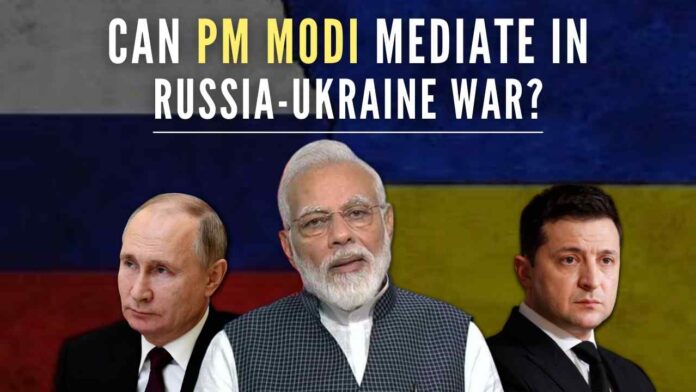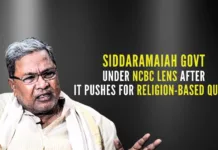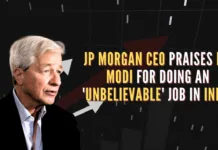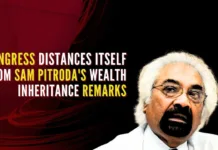
Russia is important – So is Ukraine. Can India broker peace between two sides?
The anticipated economic and geopolitical consequences of the war between Russia and Ukraine have unsettled the entire world.
The topic of peace talks between them came up a few times. Both sides started off with maximalist positions even to start the talk. It appears that both sides realize that they may not be able to accomplish their maximalist intentions, and even if they do, the cost they would pay would be more than their possible gains. But both sides don’t want a losing agreement.
The chances of an agreement will be better if a third party, acceptable to both sides mediates. Otherwise, both sides would hesitate to resile from their stated maximalist positions. Since the politically consequential world now stands almost fully divided, finding a competent mediator would be difficult.
The mediator doesn’t have to necessarily offer solutions, but just facilitate the parties to talk to each other. Diplomats assist the mediator to know how to handle the sensitivities of the two sides and ensure talks don’t derail.
India has been friendly with both Russia and Ukraine, on the basis of shared interests, but with a different focus. So many are wondering if Indian PM Modi Ji can broker peace between the two sides, also taking into account the interests of the other stakeholders. India has the benefit of a top-class diplomat, Dr. S Jaishankar as its External Affairs Minister.
If even a limited ceasefire is accomplished pending the agreement, it will be a great starting point.
The broad outlines of the starting point of a possible agreement could be an article in 2014 by Henry Kissinger, former US Secretary of State, (link below), which are still valid; this article argues the case of all the stakeholders, for and against, quite well, in a balanced way.[1]
The article concedes that the thoughts and ideas outlined are only principles, not prescriptions, and may not lead to absolute satisfaction but balanced satisfaction and dissatisfaction to all.
Minsk Agreement/ Protocol, 2014 & 2015 between the two sides partly, which includes the above ideas, was not implemented due to differing perceptions of its interpretation, and how both the sides believe the other side failed to keep its side of the promise.
I think, in the interest of world peace, of all the stakeholders, and India’s own interest, Modi Ji should accept the request of Ukraine and try to make an effort to mediate, without delay.
I quote a few key parts from the article of Kissinger below:
QUOTE: Far too often the Ukrainian issue is posed as a showdown: whether Ukraine joins the East or the West. But if Ukraine is to survive and thrive, it must not be either side’s outpost against the other – it should function as a bridge between them.
Russia must accept that to try to force Ukraine into a satellite status, and thereby move Russia’s borders again, would doom Moscow to repeat its history of self-fulfilling cycles of reciprocal pressures with Europe and the United States…
The West must understand that, to Russia, Ukraine can never be just a foreign country. …Even such famed dissidents as Aleksandr Solzhenitsyn and Joseph Brodsky insisted that Ukraine was an integral part of Russian history and, indeed, of Russia.
The European Union must recognize that its bureaucratic dilatoriness and subordination of the strategic element to domestic politics in negotiating Ukraine’s relationship to Europe contributed to turning a negotiation into a crisis. Foreign policy is the art of establishing priorities…
The West (of Ukraine) speaks Ukrainian; the East speaks mostly Russian. Any attempt by one wing of Ukraine to dominate the other – as has been the pattern – would lead eventually to civil war or break up. To treat Ukraine as part of an East-West confrontation would scuttle for decades any prospect to bring Russia and the West – especially Russia and Europe – into a cooperative international system…
A wise U.S. policy toward Ukraine would seek a way for the two parts of the country to cooperate with each other. We should seek reconciliation, not the domination of a faction.
Russia and the West, and least of all the various factions in Ukraine, have not acted on this principle. Each has made the situation worse. Russia would not be able to impose a military solution without isolating itself …. For the West, the demonization of Vladimir Putin is not a policy; it is an alibi for the absence of one…
Leaders of all sides should return to examining outcomes, not compete in posturing. Here is my notion of an outcome compatible with the values and security interests of all sides:
- Ukraine should have the right to choose freely its economic and political associations, including with Europe.
- Ukraine should not join NATO, a position I took seven years ago when it last came up.
- Ukraine should be free to create any government compatible with the expressed will of its people. Wise Ukrainian leaders would then opt for a policy of reconciliation between the various parts of their country…
Note:
1. Text in Blue points to additional data on the topic.
2. The views expressed here are those of the author and do not necessarily represent or reflect the views of PGurus.
Reference:
[1] Henry Kissinger on Ukraine – How the Ukraine crisis ends – CNNBC
PGurus is now on Telegram. Click here to join our channel and stay updated with all the latest news and views
For all the latest updates, download PGurus App.
- How China can manage its Covid situation today - December 22, 2022
- BJP’s dilemma: Winnability or right candidates? - December 15, 2022
- Strong and credible challenger to Modi - December 13, 2022










